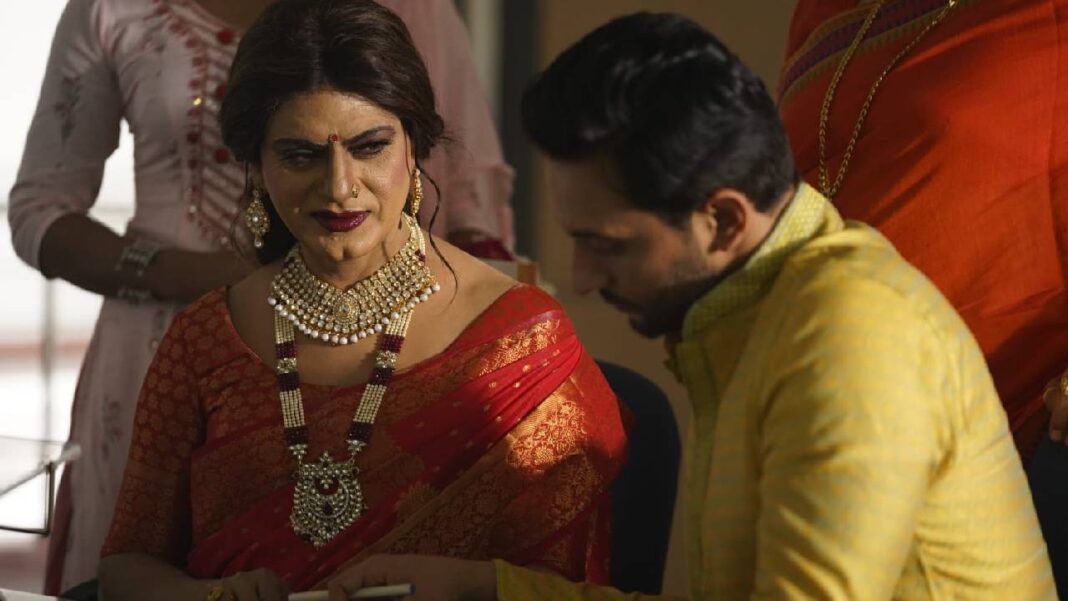Director : Akshat Ajay Sharma
Writers : Adamya Bhalla and Akshat Ajay Sharma
Cast : Nawazuddin Siddiqui, Resh Lamba, Ila Arun, Mohd. Zeeshan Ayyub, Shriidhar Dubey, Anurag Kashyap, Wasim Khan, Rahaao, Saurabh Sachdev, Vipin Sharma, Saharsh Kumar Shukla
Streaming on : Zee5
Rating : 4
TANISHA SAXENA
Films about the transgender experience weren’t always this way. A trans character was portrayed as someone who is either the punchline of all jokes, or a villain who does horrific acts without remorse. Luckily, Haddi chooses to be neither of them. Set in the backdrop of Delhi NCR, Haddi is the story of a transgender woman, Harika. “Tujhe kya lagta hai, mujhe maar ke tu aurat ban jayegi, Hijra,” says Pramod Ahlawat (played by Anurag Kashyap), a businessman in the skin of a politician. Over the course of two hours and fifteen minutes, the film explores intricacies like power structure, corruption, clan war and most significantly, how the trans community has been mistreated by society. It is unlike anything you have probably seen before in films dealing with transgender issues.
There’s a right way to feel love and there’s also a right way to feel angry. And above all else, there’s a right way to express these emotions in films via the characters. In Haddi, the best part is that the characters deal with these emotions tenderly. Thereby, portraying an authentic story.
Haddi or Harika (played by Nawazuddin Siddiqui) has moved from Allahabad, Uttar Pradesh to Delhi in order to join a gang of crossdressers and trans people. The gang is headed by Pramod Ahlawat who claims to be a good human. In the garb of development he is running an illegal trade of bone smuggling. Haddi gets into the gang but the intentions are totally different. She is seeking revenge on the people who wronged her in the past. As haddi flips the narrative—the scenario gets murkier with each step, distinguishing between sympathy and hostility and sweetness and pity.
headed by Pramod Ahlawat who claims to be a good human. In the garb of development he is running an illegal trade of bone smuggling. Haddi gets into the gang but the intentions are totally different. She is seeking revenge on the people who wronged her in the past. As haddi flips the narrative—the scenario gets murkier with each step, distinguishing between sympathy and hostility and sweetness and pity.
What should have been a straightforward retribution plot forgoes the straight in favour of something fascinatingly messier. Rather than directly delving into the issues that the transgender folks face in the society, Haddi takes an unusual approach. Through the revenge based politics, Haddi unearths the trials and tribulations of the Hijra gharana.
Sadly, the transgender folks are mistreated and abused by the powerful in society. In the film, Ahlawat takes all the property of the transgenders illegally either offering them money (deal) or forcefully. Mostly, the Hijra gharanas agree to it because of poverty. But Revathi Amma (played by Ila Arun) who is a moth?r figure to Haddi provides her with emotional support and denies signing the papers. Ahlawat commits a heinous crime against Revati Amma’s Hijra gharana, which leads to Haddi seeking revenge.
Haddi or Harika is a nuanced and layered portrayal of a transgender woman. Whether it is going through the emotional and physical turmoil of sex reassessment surgery, falling in love, celebrating the love, losing the loved ones or avenging the wrongdoing—all the emotions are captured beautifully.
Revathi maa provides haddi with emotional support throughout the journey. The film remarkably unpacks the kinship and solidarity of the oppressed. In addition to existing outside of biological families, hijra identities are thought to have developed independently of caste, class, and identity frameworks. Hijra communities or clans are the smaller systems that make up the larger structure known as society.
Another brilliant aspect of the film is how haddi, the protagonist navigates the journey with the help of the people around. Irfan (played by Mohammed Zeeshan Ayyub) lends excellent support to the character of Haddi. Besides playing Haddi’s love interest, Irfan is a strong character in terms of taking a stand in the society. He is fearless and bold. Ayyub has done a great job in showing all the emotions and strengthening Haddi’s determination to take the revenge. It is also safe to say that Siddiqui has not outdone anything when he wears makeup and wig. Right from the body language to dialogue delivery, Siddiqui was spot on.
The way the story segues into songs is also commendable. Beparda beparda beraagi Rooh ne rutba paya re Beparda beparda ab jaake Maine khud ko paya re… Tracking down the transition from Hari to Harika, the song is sung by Rekha Bhardwaj who is the soul of the film. In fact, from Kaun hai tu by Devashri Manohar and Rohan Rohan to ‘Punarjanam and Sarvanash’— all the songs are just adorning the storyline.




